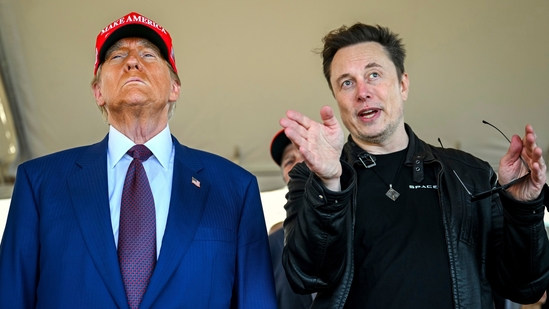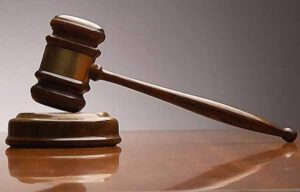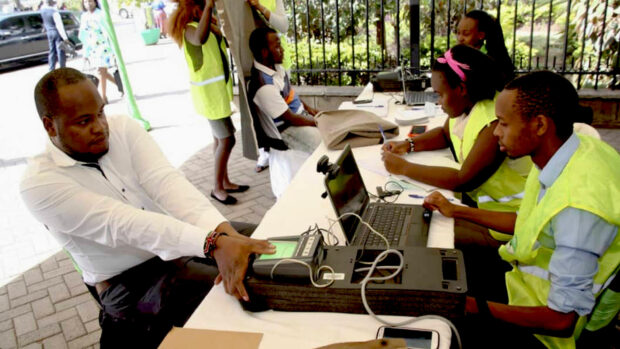

As Donald Trump steps into the presidency once again, the disturbing implications of his actions are coming into clearer focus. Most notably, what has happened to the receivership of Trump’s companies? Once under scrutiny for financial mismanagement, this receivership appears to have conveniently faded into the background since he resumed power. Is this a mere oversight, or is there a larger strategy at play that aims to shield Trump’s financial interests within a volatile political landscape?
Meanwhile, the web surrounding Elon Musk grows ever more tangled. Reports indicate that contracts worth billions for his Starlink project are being canceled left and right. These developments raise a pressing question: what do these cancellations do to Musk’s true net worth? Given his previous claims of multi-billion-dollar fortunes, the potential loss of lucrative contracts could severely impact his financial standing, possibly stripping away the valuation that has propelled him into billionaire status.
A Conflict of Interest?
With both of these powerful figures at the helm of groundbreaking technology and political influence, one must wonder: why isn’t Elon Musk being held accountable for his apparent conflicts of interest? With 11 federal agencies investigating Musk and his corporate practices, the public deserves transparency. Yet, the fates of these investigations remain shrouded in mystery. What has become of the investigations and their findings? Have the complaints and evidence been buried beneath the political machinations currently unfolding?
Furthermore, there are alarming questions about the “Doge workers” allegedly infiltrating corporate systems to undermine regulatory bodies. With Trump actively dismantling government agencies that oversee industry practices, we must ask: is the information that could expose wrongdoing still accessible? Are these governmental investigations still available for review, or have they been swept under the rug in the current climate of chaos?
Demanding Accountability
This is a critical moment for concerned citizens. People should consider filing Freedom of Information Act (FOIA) requests to obtain copies of the investigations against Musk from the relevant agencies. Key agencies, such as the SEC and the FTC, should be held accountable for transparency. What insights could be uncovered about Musk’s business practices? Are there hidden agendas that the public deserves to know?
A Call to Action:
It’s time for citizens to engage with their senators and demand answers. Why hasn’t there been greater scrutiny on Musk’s actions and the implications of Trump’s policies? What might be lurking in the shadows of these investigations?
As the narrative unfolds, it’s imperative to remember that the implications of this power grab extend far beyond mere political theatrics. The intertwining interests of Trump and Musk could reshape not just the economy but the very fabric of oversight that protects the American people. Are we, as a society, prepared to let this partnership redefine our democracy at the expense of accountability and transparency? The pursuit of truth is not just a luxury; it is a necessity.
Tagged as:
corporate investigations elon musk financial transparency political influence rump presidency
About the author
62-Year-Old Businesswoman Remanded Over $13K Fraud
Nana Ama Nwurueze, a 62-year-old self-styled businesswoman, has been remanded by the Adabraka District Court in Accra for allegedly defrauding another businesswoman, Dorothy Asare, of $13,000. Nwurueze reportedly posed as a wealthy businesswoman with substantial properties, including Ohemaa Plaza in East Legon, fishing vessels in Takoradi, and a house at Airport, to deceive the complainant.The prosecution, led by Chief Inspector Apewa Achana, has charged Nwurueze with defrauding by false pretenses. She was arrested after a bench warrant was issued against her in December last year. Despite pleading not guilty, her bail application was denied, as the court determined she was a flight risk. The case was initially reported to the Airport Police Station in 2021, but attempts to arrest her were unsuccessful until her eventual arrest in March 2024. Following her arrest, she was granted police inquiry bail but went […]
Edem 4Style March 26, 2025
President Mahama Nominates 71 New DCEs Pending Approval
President John Mahama has nominated 71 new District Chief Executives (DCEs) across various districts in Ghana, pending approval by local Assembly members. This move is aimed at strengthening local governance as these executives are expected to play a crucial role in the management of their respective districts.An official statement detailing the nominations was signed by Dr. Callistus Mahama, the Secretary to the President, and addressed to the Minister of Local Government, Chieftaincy, and Religious Affairs.While most districts have their nominees, the nomination for the Kpando district is still pending. The new DCEs will need to be confirmed by the Assembly members in their respective districts before they officially take up their roles.
Edem 4Style March 26, 2025
FIC Freezes Accounts of Bills Micro-Credit Founder, Richard Nii Armah Quaye
The Financial Intelligence Centre (FIC) has frozen all accounts associated with Richard Nii Armah Quaye, the founder of Bills Micro-Credit. This includes accounts linked to Bills Micro-Credit, Quick Credit and Investment Micro-Credit, as well as an account of Romeo-Richlove Kweku Seshie, the Chief Executive Officer of Bills Micro-Credit.The action follows a letter from the FIC, in line with Section 56(1) of the Anti-Money Laundering Act, 2020 (Act 1044), and applies to all accounts connected to the named individuals, pending further instructions. The FIC’s role involves analyzing suspicious transactions related to money laundering, terrorist financing, and other financial crimes.The move comes after a statement from the Ghana Revenue Authority revealing that Nii Armah Quaye is undergoing a personal income tax assessment for over GHS 30 million in unpaid taxes. This freeze is part of regular regulatory oversight to ensure compliance with […]
Edem 4Style March 26, 2025
Over 1,350 ECG Containers Missing from Tema Harbour Amid Procurement Breaches – Energy
The Minister for Energy and Green Transition, John Abdulai Jinapor, has raised significant concerns over the disappearance of more than 1,350 containers belonging to the Electricity Company of Ghana (ECG) from the Tema Harbour. A committee tasked with investigating the matter has uncovered serious procurement breaches that have been ongoing for several years.Jinapor shared a 103-page report on the matter, describing the findings as alarming, with a clear indication of irregularities that have affected the country’s energy sector. The Minister emphasized that law enforcement agencies would be involved to ensure that those responsible for the missing containers and procurement violations are held accountable.The disappearance of the containers and the associated procurement irregularities have sparked concerns about transparency and accountability within Ghana's energy sector, urging the government to take swift action.
Edem 4Style March 26, 2025
Ex-FIFA Chief Blatter and Platini Cleared in Corruption Case
Former FIFA President Sepp Blatter and French soccer legend Michel Platini have been cleared of corruption charges by a Swiss court. The pair were accused of authorizing a 2 million Swiss franc payment to Platini in 2011. The court ruled that there was insufficient evidence to prove the payment was fraudulent, acknowledging their consistent account of an oral agreement for the payment.The decision marks the end of a long-running legal battle, which began in 2015 and resulted in their suspension from football by FIFA. Both Blatter and Platini expressed relief following the verdict. Platini declared that his honor had been restored, while Blatter described the case as a burden that had hung over him for years.Swiss federal prosecutors are reviewing the decision and may appeal to the Swiss Federal Court.
Edem 4Style March 26, 2025
Idris Elba Honored as a Son of Ga Land, Announces Film Studio Project in Accra
On March 25, 2025, renowned British actor and filmmaker Idris Elba was honored as a son of Ga Land in a grand ceremony at the Ga Mantse Palace in Accra. The event, under the reign of King Tackie Teiko Tsuru II, celebrated Elba’s contributions to the African diaspora and his dedication to developing Ghana’s creative industry.Elba’s visit included an exciting announcement: he plans to build a world-class film studio and school on 22 acres of land near Osu Castle. This project aims to provide training, employment, and a creative hub for young Ghanaian talent, with a focus on African cinema.King Tackie Teiko Tsuru II expressed strong support for the initiative, emphasizing the need to guide the youth and advance the creative arts. The announcement was met with applause and marked a significant moment for Ghana’s growing role in the global […]
Edem 4Style March 26, 2025
Related
Italy Appoints World Cup Winner Gennaro Gattuso as Head Coach
On June 15, 2025, the Italian Football Federation (FIGC) confirmed Gennaro Gattuso as the new head coach of the Italy national team, succeeding Luciano Spalletti, who resigned after a 3-0 loss to Norway. Gattuso signed an initial one-year contract aimed at guiding Italy through the remainder of the 2026 World Cup qualifying campaign, with critical fixtures against Estonia (Sept 5) and Israel. 1. A Symbol of Italian Football The 47-year-old Gattuso is a revered figure in Italian football—capped 73 times, part of the 2006 World Cup-winning squad, and remembered for his fiery leadership on the pitch. FIGC President Gabriele Gravina echoed this sentiment: “The Azzurra jersey is like a second skin for him”, praising his passion, professionalism, and suitability to lead Italy forward. 2. Coaching Track Record Gattuso brings varied managerial experience, having led clubs such as AC Milan, Napoli (winning the […]
Ahmad June 15, 2025
Togo’s Digital Revolution: e-ID Project Brings Biometric Identity to All
A Transformational Initiative for National Development The Togolese government is making significant strides in its e-ID project, with biometric registration now actively underway in the Gulf prefecture. Citizens are flocking to centers across Lomé and surrounding areas to obtain their Unique Identification Number (NIU) - a crucial document that's becoming essential for accessing services and rights. Key Features of the e-ID System ✔ Universal coverage: Available to all residents regardless of age or nationality✔ Biometric security: Advanced technology prevents fraud and identity theft✔ Multi-purpose use: Serves as gateway to numerous government services Beyond Identification: A Tool for Social and Economic Inclusion The NIU represents much more than just an ID card - it's a powerful instrument for development: Social Benefits 🏥 Universal health coverage access🌾 Agricultural subsidies for farmers🛠 Support programs for informal workers♀ Financial inclusion for women entrepreneurs Economic Advantages 💳 Bank account opening made easier📈 Business formalization for informal sector💰 Microcredit access to grow enterprises Strengthening Governance and Security […]
Mahmud Auta June 15, 2025
2025 FIFA Club World Cup: Guide to All 32 Teams and Format
1. Dates & Format When & Where: June 14 – July 13, 2025, across 12 venues in 11 US cities. Format: 32 clubs split into 8 groups of 4; group stage → top two advance to the Round of 16 → knockouts → final (no third-place play-off) . Prize Money: Nearly £100 million total, with significant financial rewards for participating and advancing clubs. 2. Qualified Clubs by Confederation Allocation follows FIFA’s approved slot system: UEFA (12 spots): Powerhouses like Manchester City, Real Madrid, Bayern Munich, PSG, Chelsea, Juventus, Atletico Madrid, Inter Milan, Porto, Borussia Dortmund, Benfica, Red Bull Salzburg. CONMEBOL (6): Champions such as Flamengo, River Plate, Fluminense, Palmeiras, Boca Juniors, Botafogo. AFC (4): Al-Hilal, Ulsan Hyundai, J-League side Urawa Red Diamonds, Al Ain. CAF (3): Likely Al Ahly, Esperance, Wydad AC. CONCACAF (3): Inter Miami (host), Monterrey, Pachuca, plus Seattle […]
Ahmad June 15, 2025
BEPC 2024 : Le Coup d’Envoi de la Saison des Examens Nationaux
Les Épreuves du BEPC Débutent Sous Haute Surveillance La saison officielle des examens nationaux a démarré cette semaine avec le Brevet d'Études du Premier Cycle (BEPC), comme le rapporte Le Messager dans son édition de mercredi. Des milliers de candidats à travers le pays ont entamé ces épreuves cruciales qui marquent une étape clé dans leur parcours scolaire. Ce Qu'il Faut Savoir ✔ Premier examen national pour de nombreux élèves✔ Épreuves organisées dans tout le pays✔ Baccalauréat prévu dans les semaines à venir Une Organisation Rigoureuse pour Garantir la Transparence Les autorités éducatives affirment avoir tout mis en œuvre pour assurer le bon déroulement des examens : 🔹 Sécurité renforcée dans les centres d'examen🔹 Logistique optimisée pour la distribution des sujets🔹 Mesures anti-fraude pour garantir l'équité "Toutes les dispositions ont été prises pour que ces examens se déroulent dans les meilleures conditions", assure un responsable du ministère de l'Éducation. Le BEPC, Une Étape Décisive Vers le Lycée Pour de nombreux élèves, le BEPC représente :✅ Un […]
Mahmud Auta June 11, 2025
Accord de Paix en RDC : Le Retrait des Troupes Rwandaises comme Condition Clé
Les États-Unis Imposent une Exigence Stratégique Les États-Unis travaillent sur un accord de paix qui conditionne la signature au retrait préalable des troupes rwandaises de l’est de la RDC, selon des sources diplomatiques. Cette demande pourrait contrarier Kigali, qui considère les groupes armés basés en RDC comme une menace existentielle. Contexte du Projet Américain L’administration Trump mène des négociations pour :✔ Mettre fin aux violences dans l’est congolais✔ Attirer des milliards de dollars d’investissements occidentaux dans cette région riche en : Or Cobalt Cuivre Lithium Tantale Massad Boulos, conseiller de Trump pour l’Afrique, a déclaré en mai vouloir finaliser un accord "dans deux mois" – un délai ambitieux pour un conflit aux racines remontant au génocide rwandais de 1994. Les Points Clés de l’Accord Provisoire 1. Le Retrait Rwandais : Une Ligne Rouge Un projet d’accord consulté par Reuters stipule que :➡ Le retrait des troupes, armes et équipements rwandais est une condition sine qua non pour la signature. ➡ Kinshasa insiste : "Nous exigeons […]
Mahmud Auta June 10, 2025
Togo Lance l’Exploitation de la Mine de Manganèse de Nayega : Un Projet Stratégique pour l’Économie Nationale
Une Nouvelle Ère Minière pour le Togo Le Togo franchit une étape majeure dans son développement industriel avec le démarrage de l'exploitation de la mine de manganèse de Nayega, située dans la région des Savanes. Selon un communiqué de Keras Resources, partenaire technique du gouvernement togolais, la production débutera fin juin 2025 avec : 4 000 tonnes/mois en phase initiale 8 000 tonnes/mois à pleine capacité Un Minerai Stratégique pour l'Économie Mondiale Le manganèse, indispensable pour :✔ L'industrie sidérurgique (production d'aciers spéciaux)✔ La révolution verte (batteries pour véhicules électriques)✔ Les technologies renouvelables représente une opportunité économique majeure pour le Togo. Chiffres Clés du Projet Réserves estimées : 8,5 millions de tonnes Durée d'exploitation prévue : 11 ans Modèle économique : L'État togolais détient la mine via la Société Togolaise de Manganèse (STM) Keras Resources perçoit : 1,5% des revenus bruts pour conseil technique 6% pour services de courtage Impacts Économiques et Perspectives 1. Renforcement des Revenus Nationaux Ce […]
Mahmud Auta June 10, 2025














